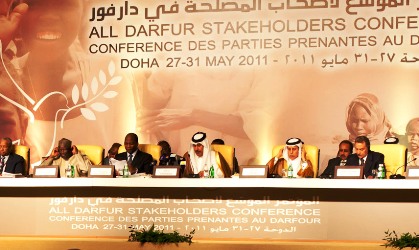Stakeholders adopt Doha framework for peace in Darfur
May 31, 2011 (DOHA) – Delegates at the All Darfur Stakeholders Conference endorsed a framework document for peace in Darfur prepared by the mediation after two year of tireless efforts despite continued tergiversations of the negotiating parties.

“The Conference endorsed the Doha draft document as the basis for reaching a permanent ceasefire, a comprehensive and inclusive peace settlement, and sustainable peace and stability in Darfur,” says the text of the final communiqué read at the colored meeting by Qatari state minister for foreign affairs Ahmed bin Abdullah Al-Mahoud.
The stakeholders further urged the Sudanese government and the rebel groups in the troubled region of Darfur to “make every effort to reach a permanent ceasefire and a comprehensive peace settlement on the basis of this document”.
Rumors and speculations circulated during the conference that a peace agreement will be signed by the Sudanese government and the Liberation and Justice Movement (LJM), excluding the Justice and Equality Movement (JEM) which initiated the Doha process by signing a goodwill agreement on 17 February 2009 with the government.
Yesterday Al-Mahmoud told reporters no peace agreement will be signed at the closing ceremony.
The Joint Chief Mediator Djibril Bassole also stressed that they are awaiting the signal from the Government of Sudan and LJM rebels who have to finalize the pending issues before signing a peace agreement.
Bassole further told Sudan Tribune that the peace document allows the government and the different rebel movements to negotiate a settlement for the conflict and reach a peace agreement within the defined framework despite their lack of unity.
The Sudanese presidential assistant Nafei Ali Nafei who was in Doha for the conference held two meetings with LJM leader, Tijani El Sissi, to discuss the outstanding issues related to the rebel demand for a post of vice-president and security arrangements. The rebels also demand to delay a referendum on Darfur’s administrative status. The Document says it should be held one year before the next presidential elections.
Amin Hassan Omer, head of government delegation to the talks told Sudan Tribune they are already engaged talks with the LJM on the two pending issues.
“We expect to finalize the discussions during the next few days and to determine a date with the mediation for the signing of a peace agreement,” he further said.
Asked about the negotiations with JEM rebels, Amin said the latter have three months to join the peace agreement. He warned that they will not accept any attempt to deviate the process or to abrogate what is agreed in the Documents.
Regarding the third rebel group which is not party in the Doha process, the Sudanese state minister said the Sudan Liberation Movement (SLM) led by Abdel Wahid Al-Nur has first to stop talking about regime change and express their will to engage talks for peace in Darfur.
“They do not want peace in Doha or elsewhere. When they prove their desire to achieve peace then we will speak on how we can deal with them,” the government top negotiator said.
The document identified seven issues as framework for future bilateral or multilateral agreement between the government and rebel groups: Compensations and return of IDPs and refugees, power sharing and administrative status of Darfur, wealth sharing , human rights and fundamental freedoms, justice and reconciliation, permanent ceasefire and security arrangements and mechanism for internal dialogue and consultation and implementation modalities.
JEM spokesperson, Gibreel Adam Bilal welcomed the document endorsed by the conference saying it “constitutes the basis for dialogue and serious negotiations between the Justice and Equality Movement and the government in the next stage”.
He pointed out that the topics discussed at the conference are basically the same agenda of talks agreed between the Movement and the Sudanese government.
Secretary General of the Communist Party Ibrahim Nugud who is also a leading member of the Sudanese opposition alliance praised the outcome of the five day meeting saying that the adopted text responds to the aspirations of Darfur’s people.
He further added that the other rebel movements who are not part of the Doha process should join the talks to end the suffering of Darfur’s people.
“Darfur people cannot wait the overthrow of this regime, do you want them to die?” he told Sudan Tribune on the sidelines of the meeting.
The delegates to the conference were impressed by the huge logistical means deployed by the Qatari government and the neutral attitude of the host country.
Qatar’s state minister for foreign affairs Ahmed bin Abdullah Al-Mahmoud and the JMC Djibril Bassole were, on Tuesday evening, celebrated by the Darfurian community in Doha in recognition of their role in the process and the efforts exerted to end the eight year conflict in Darfur.
(ST)
